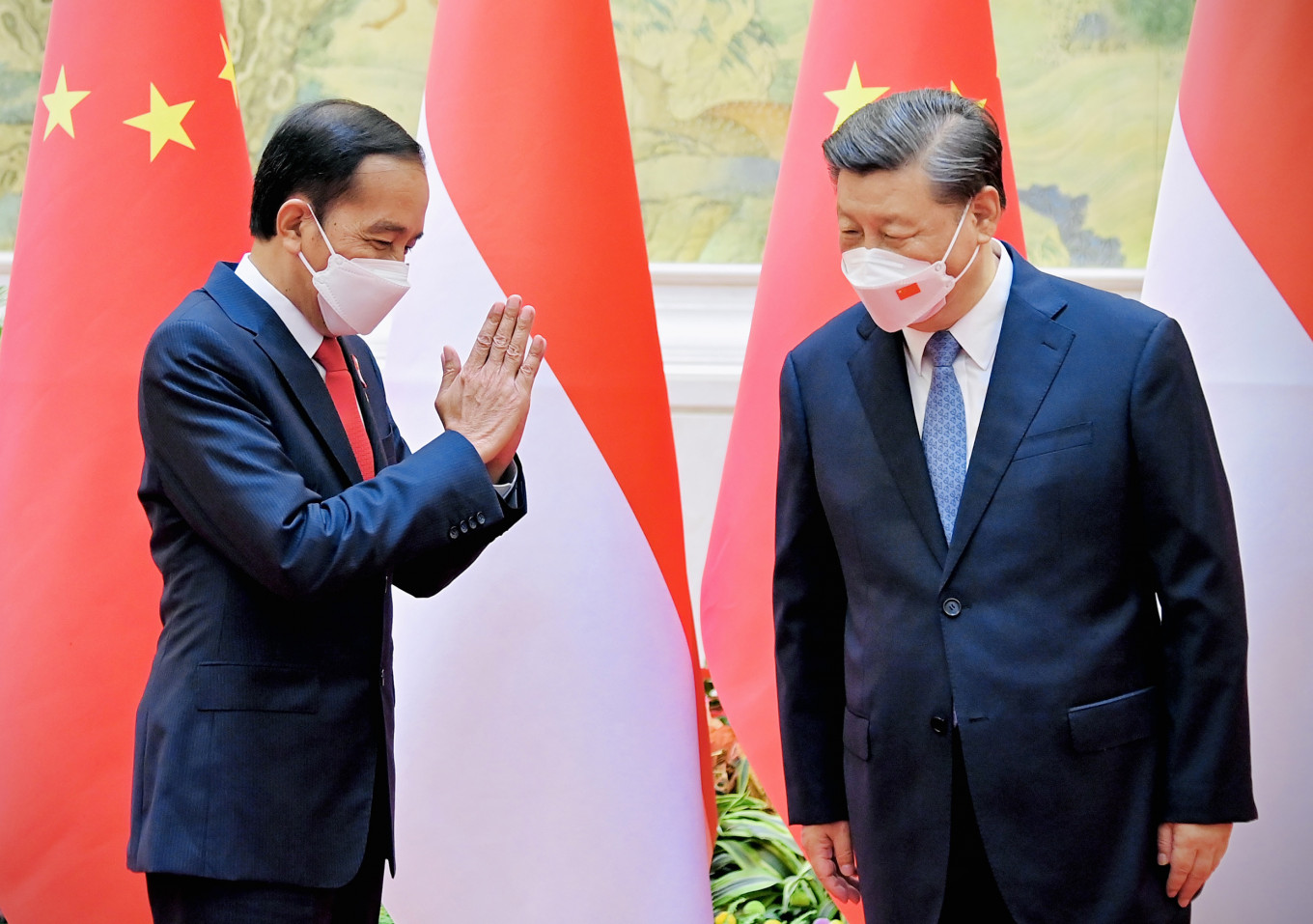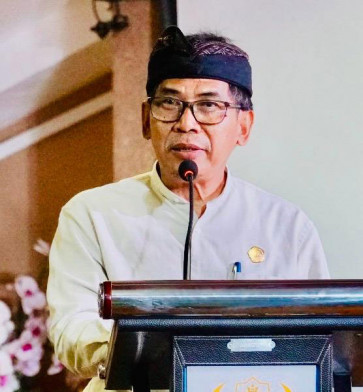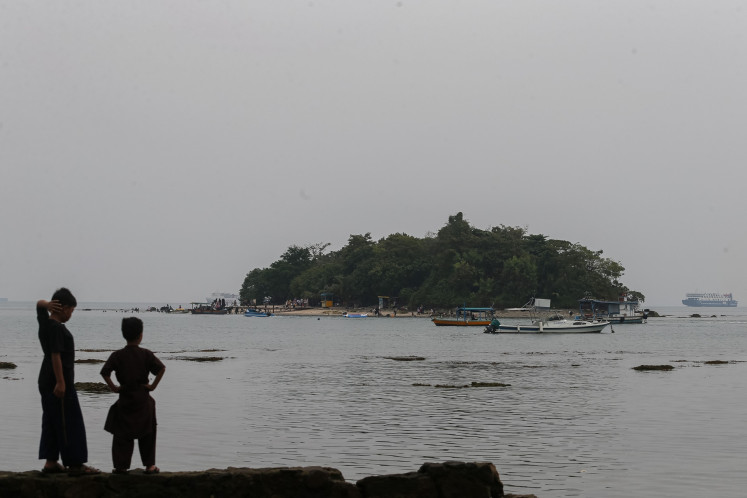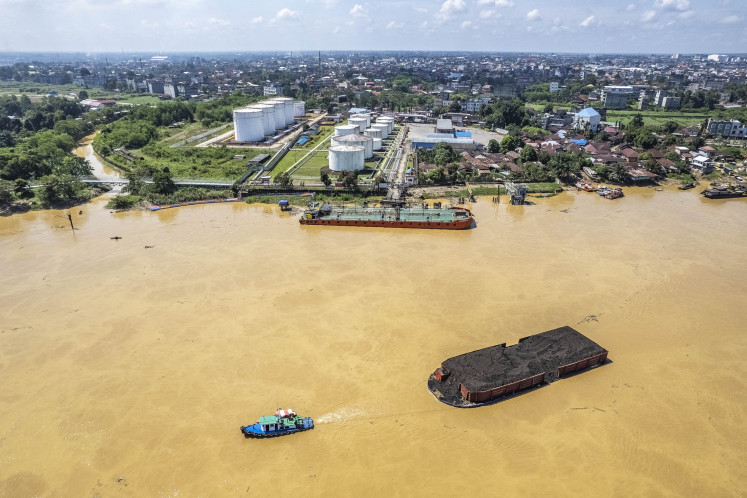Popular Reads
Top Results
Can't find what you're looking for?
View all search resultsPopular Reads
Top Results
Can't find what you're looking for?
View all search resultsJokowi’s East Asian trip for pineapples and railways
During the encounter with his host Chinese President Xi Jinping at the Diaoyutai State Guesthouse on July 26, President Jokowi raised a sensitive bilateral issue, namely the Jakarta-Bandung railway project.
Change text size
Gift Premium Articles
to Anyone

P
resident Joko “Jokowi” Widodo demonstrated his favorite down-to-earth diplomacy when he visited Beijing, Tokyo and Seoul last week. In Beijing he promoted Indonesian pineapples and raised his concern of the Jakarta-Bandung high speed train project, while in Tokyo he called on Japan to import more fruits and accelerate the completion of Jakarta’s MRT project.
In the last leg of his four-day trip, Jokowi succeeded in winning a major concession from new South Korean President Yoon Suk-yeol, who promised to participate in the relocation of Indonesian capital city to Nusantara in East Kalimantan. But Jokowi also faced a moment of embarrassment when President Yoon reminded him about Indonesia’s unsettled financial commitment in the joint fighter jet project.
Jokowi also discussed the Group of 20 summit in Bali that he will host in November, the skyrocketing prices of energy and food and North Korea’s nuclear threats, as he did when attending the Group of Seven summit and visiting Moscow and Kyiv last month.
Jokowi’s main agenda in the East Asian trip heavily focused on bilateral issues, including promoting Indonesian fruits, considering the fact that the three countries are Indonesia’s main sources of investment and key trading partners.
During the encounter with his host Chinese President Xi Jinping at the Diaoyutai State Guesthouse on July 26, President Jokowi raised a sensitive bilateral issue, namely the Jakarta-Bandung railway project. The project will be completed only in June next year, far beyond the initial target of 2019. As a consequence, its cost has increased by 23 percent from the original estimate of US$6.07 billion.
Public criticism against the project comes as no surprise for at least three reasons.
First, the project seemed to lack a comprehensive feasibility study. Japan had completed its feasibility study and offered loan facilities, including very low-interest rates and long-term repayment, in 2015. In September of that year, out of a sudden, however, Jokowi shifted to China, because he fell in love with its business-to-business financing promise. The project would go to state-owned companies from both sides, however, In the end it turned into government-to-government affair just as Japan had proposed.
Second, I believe the postponement was not caused by technological or expertise problems. I suspect the Chinese side is not familiar with democratic practices. The situation in China today is similar to Indonesia under the Soeharto regime, when the government could easily force its wishes against the people in the name of development. All Soeharto’s instructions were faithfully obeyed from the top to the lowest rung of bureaucracy.
Third, Indonesia committed a blunder from the very beginning, when the two governments formed the Indonesian-China High Speed Train Consortium (KCIC). According to the agreement, in the case of any cost overrun, Indonesia would be responsible for 60 percent of the total additional cost and the rest for China. Many negative comments were expressed on mainstream and social media platforms about the “strange” loss ratio.
Jokowi and Xi hopefully have reached a mutual understanding for a win-win solution after Indonesia asked for renegotiation on the loss burden. The issue is sensitive for both sides and Indonesians are worried about debt-trap threats.
Fruits also became a serious topic in Jokowi’s meeting with Japanese Prime Minister Fumio Kishida. In Tokyo, the President urged PM Kishida to reduce import tariffs for tuna, bananas and pineapple, and market access for mango from Indonesia. Japan has abolished the quota for Indonesian pineapple but still imposes a 10-20 percent import duty.
You may laugh about pineapple, but then you will nod when you learn the commercial value of the exotic fruit. Indonesia produced 2,886 tons of pineapple in 2021, up from 2,447 tons in 2020, from Lampung, Central Java and West Java. In 2020, the fruit export was worth $274.12 million.
President Jokowi also asked PM Kishida to accelerate the completion of the second, third and fourth phases of Jakarta’s MRT. Japan’s International Cooperation Agency (JICA) has expressed its readiness to finance the second phase. But does it mean that the President has approved Japan’s government-to-government financing scheme?
Jokowi has learned from the high-speed train project. In Tokyo, he praised Japan’s high-quality products, although he also wanted a more “competitive” price. People highly appreciate the Japan-built MRT connecting Lebakbulus-Hotel Indonesia (HI) traffic circle which started operation in March 2019.
Jokowi asked PM Kishida to accelerate phase two, which will connect the HI traffic circle to Kota and Ancol in North Jakarta. The total Rp32.5 trillion ($2.19 billion) cost is covered by a loan from JICA just like phase one. Its operation is expected to start in 2030.
The President also explicitly endorsed Japan as the contractor of the two remaining MRT construction projects, the 87-kilometer-long Bekasi in West Java to Balaraja in Tangerang, Banten, and the 12-kilometer-long route from Lebakbulus to Indonesian Miniature Park in East Jakarta. The projects are expected to cost Rp 188 trillion and will be finished in 2030.
But if I were PM Kishida, I would have asked President Jokowi: “Your Excellency, won’t you change your mind on the MRT project at the very last minute as we experienced in September 2015?” Japan deserved an honest answer from the President because they still cannot forget the high-speed train project debacle.
In the last part of his four-day trip, Jokowi succeeded in luring President Yoon to invest in the development of the new city capital Nusantara. But Yoon also reminded his guest about Indonesia’s unpaid financial obligation in the joint KF-21 aircraft project.
“Indonesia has yet to pay its share of the cost of the project due to what it claims are economic difficulties,” Yonhap news agency reported. The two leaders, however, agreed “to accelerate working-level talks on the issue”.
President Jokowi’s tour shows the three countries will remain Indonesia’s key partners in investment, development cooperation and trade.
***
The writer is a senior editor at The Jakarta Post.









